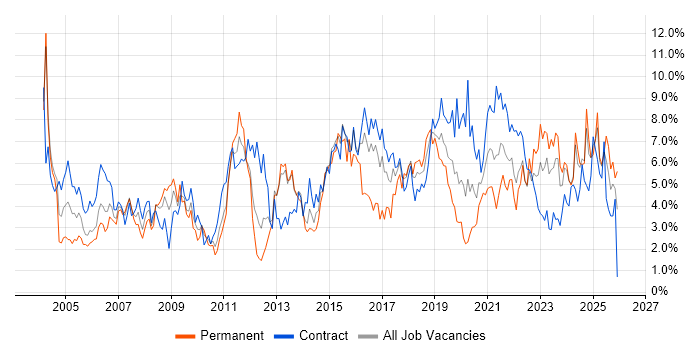Architect
Tyne and Wear > Newcastle upon Tyne
The median Architect salary in Newcastle upon Tyne is £65,000 per year, according to job vacancies posted during the 6 months leading to 6 September 2025.
The table below provides salary benchmarking and summary statistics, comparing them to the same period in the previous two years.
| 6 months to 6 Sep 2025 |
Same period 2024 | Same period 2023 | |
|---|---|---|---|
| Rank | 19 | 19 | 17 |
| Rank change year-on-year | 0 | -2 | +30 |
| Permanent jobs requiring an Architect | 36 | 51 | 32 |
| As % of all permanent jobs advertised in Newcastle upon Tyne | 7.69% | 6.90% | 7.94% |
| As % of the Job Titles category | 8.13% | 7.05% | 8.74% |
| Number of salaries quoted | 33 | 28 | 17 |
| 10th Percentile | £61,250 | £59,043 | £70,500 |
| 25th Percentile | £62,500 | £60,000 | £76,250 |
| Median annual salary (50th Percentile) | £65,000 | £70,000 | £85,000 |
| Median % change year-on-year | -7.14% | -17.65% | +13.33% |
| 75th Percentile | £73,750 | £85,000 | £88,750 |
| 90th Percentile | £97,000 | - | £99,500 |
| Tyne and Wear median annual salary | £65,000 | £70,000 | £85,000 |
| % change year-on-year | -7.14% | -17.65% | +13.33% |
All DemandTrendPermanent IT Job Vacancies
Newcastle upon Tyne
For comparison with the information above, the following table provides summary statistics for all permanent IT job vacancies in Newcastle upon Tyne. Most job vacancies include a discernible job title that can be normalized. As such, the figures in the second row provide an indication of the number of permanent jobs in our overall sample.
| Permanent vacancies in Newcastle upon Tyne with a recognized job title | 443 | 723 | 366 |
| % of permanent jobs with a recognized job title | 94.66% | 97.83% | 90.82% |
| Number of salaries quoted | 302 | 462 | 313 |
| 10th Percentile | £25,000 | £30,000 | £31,050 |
| 25th Percentile | £28,875 | £36,250 | £38,634 |
| Median annual salary (50th Percentile) | £47,750 | £50,000 | £52,500 |
| Median % change year-on-year | -4.50% | -4.76% | -4.55% |
| 75th Percentile | £65,000 | £68,113 | £67,500 |
| 90th Percentile | £74,875 | £84,964 | £77,500 |
| Tyne and Wear median annual salary | £45,000 | £45,000 | £50,000 |
| % change year-on-year | - | -10.00% | -4.76% |
Architect
Job Vacancy Trend in Newcastle upon Tyne
Job postings that featured Architect in the job title as a proportion of all IT jobs advertised in Newcastle upon Tyne.

Architect
Salary Trend in Newcastle upon Tyne
Salary distribution trend for Architect job vacancies in Newcastle upon Tyne.

Architect
Salary Histogram in Newcastle upon Tyne
Salary distribution for jobs citing Architect in Newcastle upon Tyne over the 6 months to 6 September 2025.
Architect Skill Set
Top 30 Co-occurring Skills and Capabilities in Newcastle upon Tyne
For the 6 months to 6 September 2025, Architect job roles required the following skills and capabilities in order of popularity. The figures indicate the absolute number co-occurrences and as a proportion of all permanent job ads across the Newcastle upon Tyne region featuring Architect in the job title.
|
|
Architect Skill Set
Co-occurring Skills and Capabilities in Newcastle upon Tyne by Category
The follow tables expand on the table above by listing co-occurrences grouped by category. The same employment type, locality and period is covered with up to 20 co-occurrences shown in each of the following categories:
